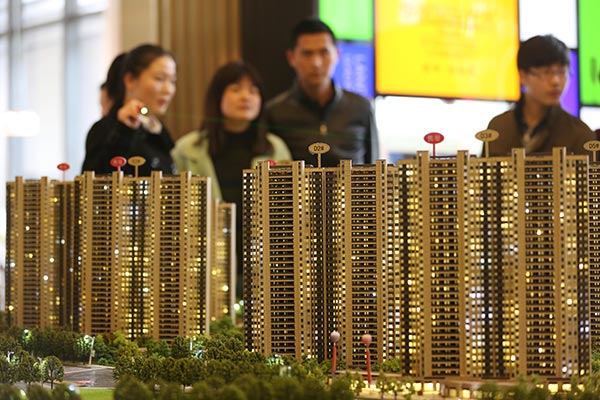 |
|
Potential homebuyers examine a property project model in Nanjing, East China's Jiangsu province. [Photo/VCG] |
Real estate has remained one of the pillar industries supporting China's economy this year, but the ever-in-creasing divergence between the housing markets in various cities has become a noticeable trend.
Due to favorable real estate-related policies and positive changes in people's expectations of the market, China's real estate market has heated up rapidly since the beginning of the year.
And despite the sluggish investment in the real economy, especially in the private sector, investment in real estate maintained high growth.
According to data from the National Bureau of Statistics, the year-on-year growth rate of real estate investment reached a high record of 7.2 percent from January to April, while the year-on-year growth rate for 2015 was only 1 percent.
Even with the gradual slowing in recent months due to the introduction of real estate policies for that purpose, real estate investment maintained a 5.3 per-cent year-on-year growth from January to July.
Housing sales also warmed up in the past few months. House sales recorded double-digit growth year-on-year in the first seven months of 2016, while the growth rate was only 6.5 percent in 2015. From January to July, the overall national housing sales turnover increased 39.8 percent year-on-year, while the figure was 14.4 percent in 2015.
The government's bid to reduce the real estate inventory therefore made some progress. By the end of July, there was 713.82 million square meters of housing for sale nationwide, down by 4.71 million sq m since the end of 2015.
As the pressures from the economic downturn and the implementation of regulatory policies in various cities are further felt, the real estate industry is expected to experience moderate but stable growth over the next half year.
"We expect housing sales will remain a comparatively high growth rate. House prices will basically remain stable and real estate investment will maintain stable growth in the second half of this year," said Xu Kunlin, deputy secretary-general of the National Development and Reform Commission, in a news briefing on deepening investment and financing reform on July 25.
However, the housing market trends in first-and fourth-tier cities diverge remarkably.
The Chinese Academy of Social Sciences forecast in an interim report issued in July that polarization of China's real estate market will further intensify with housing prices in first-and second-tier cities with good economic, transportation and environment conditions continuing to rise, while the housing prices in the majority of third-and fourth-tier cities will increase only slightly and they will face great challenges in reducing inventory.
"The real estate industry has stepped into a stage of differentiation, adjustment and optimization," said Sheng Laiyun, spokesman of the National Bureau of Statistics at the media briefing in July. "Local government's policies should be in accordance with the actual situation of the local housing market."
